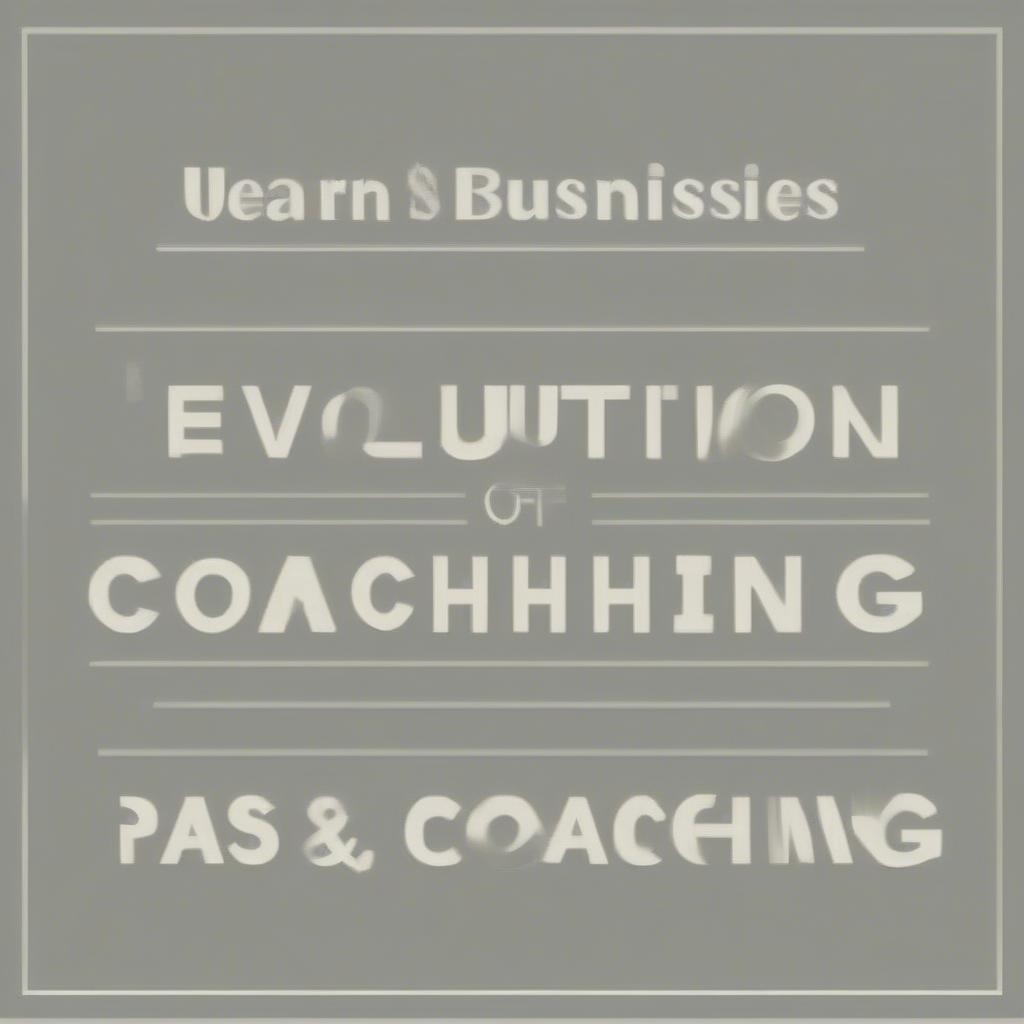
Coaching, an incredibly rewarding profession, comes with its unique set of hurdles. Whether you’re a life coach, business coach, or health coach, navigating these challenges is crucial for your success and the success of your clients. This article dives deep into the most common coaching challenges, offering practical solutions, and providing essential industry insights to help you thrive in the coaching world.
1. Finding and Attracting the Right Clients
One of the biggest coaching challenges for new and even seasoned coaches is attracting their ideal client. You might be incredibly skilled, but if you’re not reaching the right people, your practice will struggle.
1.1 Defining Your Niche
Why is this a challenge? Many coaches try to be everything to everyone, which dilutes their message and makes it harder to stand out. When you’re speaking to everyone, you’re speaking to no one.
Solution: Identify your passion and expertise. What kind of clients do you truly enjoy working with? What results do you get best? Focus on a specific niche. For example, instead of just being a "business coach," specialize in "small business marketing coaching" or "leadership coaching for tech startups."
Steps:
- Self-Reflection: What are you genuinely good at? What type of client interactions energize you?
- Market Research: What are the unmet needs in the market? Where is there demand?
- Niche Statement: Create a clear statement that defines your target client and their needs. "I help [target client] achieve [desired result] by [your unique approach]".
- Test the Market: Share content and engage with your niche to test the waters and refine your message.
Benefits: A well-defined niche makes your marketing more targeted and effective, attracting clients who are a perfect fit. It also positions you as an expert in your field.
1.2 Effective Marketing and Branding
Why is this a challenge? Many coaches struggle with marketing, unsure of where to start or how to connect with their audience authentically.
Solution: Develop a consistent brand and use multiple marketing channels to reach your audience.
Strategies:
- Website: Create a professional website showcasing your expertise, testimonials, and contact information.
- Social Media: Choose 1-2 platforms where your target clients hang out and create valuable content consistently. Engage with your audience authentically.
- Content Marketing: Blog posts, articles, podcasts, videos – create valuable content that attracts your ideal clients.
- Networking: Attend industry events, both online and in-person, to connect with potential clients and referral partners.
- Free Content Offers: Offer a free guide, checklist, webinar, or initial consultation to attract leads and showcase your value.
- SEO: Optimize your online presence for relevant keywords so potential clients can find you when they search online.
Template: Content Calendar
| Week | Content Type | Platform | Topic | Keyword(s) | Call to Action |
|---|---|---|---|---|---|
| 1 | Blog Post | Website | Top 5 Time Management Tips for Entrepreneurs | time management, productivity, coaching for entrepreneurs | Read More, Share |
| 2 | Social Media Post | What are your biggest productivity struggles? | time management, productivity | Engage in comments | |
| 3 | Podcast Episode | Podcast App | Overcoming Imposter Syndrome as a Coach | imposter syndrome, coaching challenges, confidence | Listen on… |
| 4 | Free Guide | Landing Page | The Ultimate Guide to Goal Setting | goal setting, coaching | Download Now |
Tips: Authenticity is key. Share your own journey, challenges, and insights. Be consistent and patient – it takes time to build a brand.
1.3 Demonstrating Value and ROI
Why is this a challenge? Many potential clients are skeptical about coaching and its value. They may not understand what it entails.
Solution: Clearly articulate the benefits and ROI of your coaching services. Use testimonials, case studies, and before-and-after examples to show your impact.
Strategies:
- Client Testimonials: Request testimonials from past clients, highlighting specific results they achieved through your coaching.
- Case Studies: Create detailed case studies that showcase the process, challenges, and solutions you provided to clients.
- Free Discovery Calls: Use free initial consultations to demonstrate your value by offering practical advice and addressing specific pain points.
- Results-Oriented Language: Frame your coaching in terms of specific, measurable, achievable, relevant, and time-bound (SMART) outcomes.
Example: Instead of saying "I offer accountability," say "I help entrepreneurs achieve their revenue goals by providing weekly accountability and strategic planning."
Benefit: When potential clients see tangible results, they’re more likely to invest in your coaching.
2. Structuring Effective Coaching Sessions
Another common coaching challenge lies in creating coaching sessions that are effective, engaging, and lead to lasting results for clients.
2.1 Setting Clear Goals and Objectives
Why is this a challenge? Without clear goals, coaching sessions can become rambling and unproductive.
Solution: Work with your clients to define specific, measurable, and time-bound goals at the beginning of each engagement.
Steps:
- Initial Consultation: Discuss your client’s needs, aspirations, and challenges.
- SMART Goal Setting: Together, create 1-3 SMART goals for each coaching session, or for the engagement overall.
- Regular Check-Ins: Monitor progress toward goals and adjust as needed.
Template: Goal Setting Worksheet
| Goal | Specific | Measurable | Achievable | Relevant | Time-Bound |
|---|---|---|---|---|---|
| Example: Increase sales | Increase sales by 10% | Revenue increase tracked monthly | Realistic and possible for the client | Directly related to business growth | By the end of the quarter |
| Client Goal 1 | |||||
| Client Goal 2 | |||||
| Client Goal 3 |
Benefit: Clear goals provide a framework for your coaching sessions, ensuring that both you and your client are working toward the same outcomes.
2.2 Active Listening and Powerful Questioning
Why is this a challenge? Coaches often fall into the trap of giving advice rather than empowering clients to find their own solutions.
Solution: Develop strong active listening skills and use powerful, open-ended questions to help clients reflect and gain insights.
Strategies:
- Active Listening: Pay full attention to your client, using non-verbal cues (eye contact, nodding) and verbal cues (summarizing, paraphrasing) to show engagement.
- Powerful Questions: Ask open-ended questions that encourage reflection and deeper thinking. Examples:
- "What would success look like for you in this situation?"
- "What options have you considered?"
- "What is holding you back?"
- "What resources do you need?"
- "What would happen if…?"
- Silence: Allow for silence after asking questions to give your client time to process.
Tips: Avoid jumping to conclusions or interrupting your clients. Your role is to facilitate their journey, not to provide all the answers.
2.3 Maintaining Momentum and Accountability
Why is this a challenge? Clients can easily lose motivation or get distracted, leading to a lack of progress.
Solution: Implement systems to maintain momentum and ensure client accountability.
Strategies:
- Action Plans: After each session, work with your client to create a specific action plan with clear steps and deadlines.
- Progress Tracking: Use a tracking system (e.g., a spreadsheet, app, or shared document) to monitor progress on goals and action plans.
- Check-ins: Schedule regular check-ins between sessions to address any challenges and keep clients on track.
- Accountability Partners: Encourage clients to find an accountability partner to support them in achieving their goals.
Template: Action Plan Template
| Action Step | Deadline | Resources Needed | Priority | Status |
|---|---|---|---|---|
| Example: Draft a blog post | Next Friday | Computer, writing software, access to blog platform | High | To Do |
| Action Step 1 | ||||
| Action Step 2 | ||||
| Action Step 3 |
Benefit: Structured action plans and regular check-ins help clients stay motivated and accountable, increasing the likelihood of achieving their goals.
3. Handling Difficult Client Situations
Inevitably, every coach will encounter challenging client situations. Navigating these situations with professionalism and empathy is vital.
3.1 Dealing with Resistance and Lack of Engagement
Why is this a challenge? Some clients might resist the coaching process, showing up unprepared or disengaged.
Solution: Understand the underlying reasons for resistance and address them with compassion and directness.
Strategies:
- Open Communication: Have an open and honest conversation about the resistance you are noticing. Ask questions to understand the cause.
- Revisit Goals: Ensure that the client is still aligned with the goals set during the initial sessions. Are they still relevant and motivating?
- Adapt Your Approach: Change your coaching style if needed. Some clients might need a more directive approach, while others require more space and reflection.
- Empathy and Understanding: Be empathetic to their situation and avoid making them feel judged. Resistance is often a sign of fear or overwhelm.
- Set Boundaries: If the resistance persists, and it isn’t constructive, clearly set expectations and boundaries.
Example: "I’ve noticed that you’ve seemed less engaged lately. I’m curious to know what’s going on for you and how I can better support you."
Benefit: Addressing resistance head-on can help clients overcome their barriers and fully engage in the coaching process.
3.2 Managing Unrealistic Expectations
Why is this a challenge? Clients sometimes have unrealistic expectations about what coaching can achieve. They may be expecting overnight transformations.
Solution: Manage expectations by setting clear boundaries and timelines.
Strategies:
- Clear Communication: Set realistic expectations about the coaching process, timelines, and potential outcomes.
- Focus on Progress: Emphasize the importance of small, consistent steps towards goals.
- Celebrate Milestones: Acknowledge and celebrate progress, even if it’s small. This helps clients recognize how far they’ve come.
- Reality Check: When necessary, provide a reality check by sharing relevant examples or insights.
Example: "Coaching is a journey, not a quick fix. While we will work toward your goal, it’s important to be patient and celebrate the small wins along the way."
Benefit: Managing expectations from the outset prevents disappointment and fosters a more positive and productive coaching experience.
3.3 When to Refer a Client
Why is this a challenge? Sometimes, a client’s needs extend beyond your scope of expertise, or if they’re experiencing an emotional or mental health condition that requires therapy, it can be challenging to know when to refer.
Solution: Know your limits and refer clients to other professionals when necessary.
Steps:
- Recognize the Signs: Be aware of red flags that might indicate a need for specialized care, such as mental health struggles, financial distress, or relationship issues that require therapy.
- Open Conversation: Have an honest and compassionate conversation with the client. Explain that their needs are outside the scope of your expertise and recommend the support they need.
- Referral Network: Develop a network of trusted professionals (therapists, financial advisors, specialists, etc.) to whom you can refer clients.
- Follow Up: After referring, follow up with the client to see if they connected with the professional and are getting the support they need.
Example: "It seems like your anxiety is significantly impacting your ability to progress towards your goals. It would be beneficial for you to work with a therapist in addition to our coaching, so I’d be happy to give you a few recommendations."
Benefit: Knowing when to refer ensures your clients get the right support and protects you from practicing beyond your competence.
4. Building a Sustainable Coaching Business
Beyond the day-to-day coaching sessions, it’s crucial to build a sustainable business that supports your growth and longevity.
4.1 Setting Your Pricing and Packaging
Why is this a challenge? Many coaches struggle with pricing their services, either undervaluing their work or pricing themselves out of the market.
Solution: Price your services in a way that reflects your value and allows you to build a sustainable business.
Strategies:
- Research the Market: See what other coaches with similar experience are charging for similar services.
- Value-Based Pricing: Focus on the value and results you offer rather than just hourly rates.
- Packages: Create coaching packages that provide better value and incentivize clients to commit to longer-term engagements.
- Payment Plans: Offer payment plans to make your coaching more accessible.
- Regular Review: Regularly review your pricing to ensure it aligns with your experience and market value.
Example: Offer a three-month package at a slightly reduced rate compared to booking single sessions, rather than pricing based on the hour.
Benefit: Strategic pricing ensures you’re valued appropriately and allows for the long-term sustainability of your business.
4.2 Managing Your Time and Energy
Why is this a challenge? Coaches often struggle to balance coaching work with business management, leading to burnout.
Solution: Implement systems for managing your time and energy effectively.
Strategies:
- Time Blocking: Allocate specific time blocks for coaching, marketing, and administrative tasks.
- Batching: Group similar tasks together to improve efficiency (e.g., scheduling all social media posts in one session).
- Boundaries: Set clear boundaries around your work hours and personal time.
- Delegation: Outsource tasks that don’t require your direct expertise, such as accounting, social media management, or virtual assistance.
- Self-Care: Make time for self-care activities that nourish your mind, body, and spirit.
Tip: Protect your energy and avoid overbooking.
Benefit: Effective time and energy management prevents burnout and allows you to be more present and effective for your clients.
4.3 Continuous Learning and Growth
Why is this a challenge? The coaching industry is constantly evolving. To remain competitive, you need to be committed to learning and growth.
Solution: Dedicate time for continuous professional development.
Strategies:
- Stay Updated: Follow industry leaders and trends.
- Attend Training and Workshops: Invest in professional development courses that expand your knowledge and skills.
- Peer Supervision: Engage in peer supervision to gain valuable insights and feedback from fellow coaches.
- Seek Feedback: Regularly seek feedback from your clients to continuously improve your coaching skills.
- Experiment and Innovate: Don’t be afraid to try new techniques or approaches.
Benefits: Continuous learning keeps your skills sharp, expands your expertise, and increases your value to clients.
5. How Learn Business Supports Coaches
Learn Business is a platform that understands the unique challenges coaches face. We provide the resources and support you need to build a thriving coaching business. We know that coaches have all the skills and expertise, they just need the templates and guidance to streamline the business side of things.
5.1 Business Guidance and Templates
Learn Business offers a wide range of business guides and templates specifically tailored for coaches. Whether you need help with marketing, sales, or client management, we have templates that help streamline the process.
Here’s How Learn Business Can Help You:
- Client Onboarding Templates: Streamline your client onboarding process with ready-to-use templates for contracts, intake forms, and welcome packages.
- Marketing Templates: Use templates for creating social media content, email marketing campaigns, and website copy.
- Pricing and Packaging Templates: Simplify the process of pricing and creating your coaching packages.
- Time Management Templates: Improve your efficiency with templates for time blocking, goal setting, and project management.
- Financial Tracking Templates: Easily manage your income and expenses with ready-made financial tracking spreadsheets.
- Legal Templates: We provide legal templates to ensure you are covered in all aspects of your business.
- And Much More: We have all the templates a coach needs to start, build, and grow a thriving coaching business.
Benefits: Our templates save you time, money, and stress, allowing you to focus on what you do best – coaching your clients.
5.2 Expert Support and Community
At Learn Business, we go beyond templates to provide expert business guidance. Our team of experienced business consultants are ready to guide you every step of the way, and we offer peer support in our online community so you can connect with other coaches and ask questions, and learn from each other.
How We Support You:
- Personalized Business Consultation: Schedule one-on-one consultations to get tailored advice and guidance.
- Online Community: Join our active online community to connect with other coaches, share insights, and ask for support.
- Monthly Q&A Sessions: Get your questions answered in our live monthly Q&A sessions with business experts.
Benefits: Our expert support and community ensures you have access to the resources, support, and encouragement to succeed.
5.3 Focus on Your Strengths
Learn Business helps you with all aspects of running a business, allowing you to focus on your strengths and do what you do best.
Why Coaches Benefit from Learn Business:
- Time Saver: Our templates and guides help you save time by simplifying the administrative aspects of business.
- Resourceful: Gain access to a wealth of templates, guides, advice, and support.
- Focused: By streamlining business, coaches can focus on helping their clients.
Conclusion
Being a coach is incredibly rewarding, but it doesn’t come without its challenges. By understanding these coaching challenges, implementing the solutions outlined in this article, and leveraging the industry insights available, you can create a thriving and sustainable coaching practice. At Learn Business, we’re dedicated to empowering coaches by providing the essential tools, guidance, and community they need to succeed. Start your journey to a more successful coaching business today, by leveraging all that Learn Business has to offer.



Leave a Reply